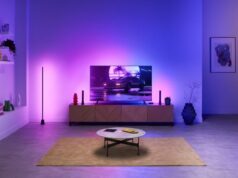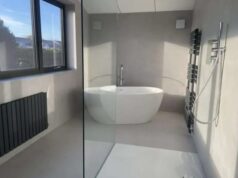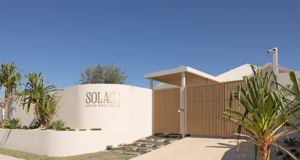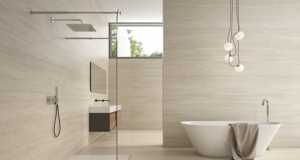
Depending on your shower screen or curtain, you may also need to consider how much light will be blocked.

The way lighting is configured in your bathroom can have a tremendous impact on how usable your bathroom is – and a particularly important aspect of bathroom lighting design is the way the lighting works with your shower. Unless you have a wet room shower or your shower uses completely transparent shower screens, it’s likely that light will be blocked off from your shower stall, and that it’ll be a bit dark. If your shower area’s poorly lit it may look and feel dull, or worse, it may become a serious hazard. Designing for good lighting in your shower doesn’t have to be difficult though. All it requires is a little common sense.
Overhead lighting
If you do have opaque shower screens or a thick shower curtain that blocks light from entering your shower area, installing an overhead light might be a good solution. Even if you have a completely transparent shower screen, installing a light over your shower stall can make the area far brighter, safer and more comfortable.
Lighting over a shower must be waterproofed to a rating of IP67, to ensure that steam doesn’t enter the light fitting and cause electrical problems. If you are choosing recessed lights like halogen or LED spots, glass covers can be easily acquired that will fit this specification and stop steam and condensation. This kind of lighting can really make your shower stand out from the rest of your bathroom, especially if you have spent some money on a frameless screen.

Specialised shower lighting
As well as basic overhead lighting for showers, you can also buy specialised shower lighting solutions too, such as banks of LED lights you can install in shower walls or along the top of the shower screen. Because they’re mostly an aesthetic option, you should take into account how they’ll look as a part of your overall bathroom design.
There are a surprising number of shower heads available that incorporate LED lighting in them too. These can really add another dimension to the design of your bathroom. LED-lit shower heads are available in a wide range of colours, and some even have temperature sensors in them which alter the colour of the light as the temperature changes. The diversity of shower head designs means that LED lights can be integrated in just about any type of shower head available.
For more advice about what sort of lighting options are available for your shower, speak to a bathroom designer, a lighting designer or a bathroom or lighting retailer.





